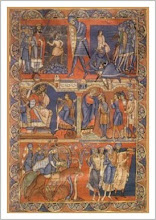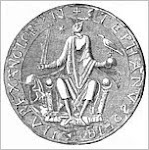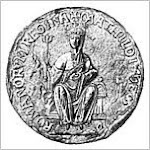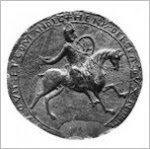• Postscript: A Last Word on Matilda, The Empress, Lady of the English
It seems historians haven't always been overly kind to Matilda, more often than not portraying her as imperious, haughty, and demanding. Her supposedly high handed treatment of the London citizenry during those brief few months when the crown of England was within her grasp after the capture of Stephen in the Battle of Lincoln in February 1141 is almost always held up as an example of her 'stubborn, wilful behaviour'. Admittedly it probably wasn't a smart move to anger them since Stephen had always been popular with the Londoners and perhaps she and her supporters underestimated the Queen's ability to muster support to Stephen's cause.
It is logical to assume that her first marriage to Emperor Henry V not only elevated her to a high position but would have taught her much about rulership during her formative years. In addition, it seems natural that as Henry I's only surviving legitimate child, but more importantly as his declared heir, she would have had certain expectations to rule England and pass the crown onto her own heir Henry II. Conversely, perhaps the early elevation to high status during her first marriage (she was only approximately 9 years old when she was sent to Germany and 21-23 years old at the Emperor's death in 1125) helped cultivate the haughtiness that the chroniclers accuse her of. Suffice to say this is just speculation on my part. Whatever the case, imperious and demanding is the default image of Matilda that writers have passed down to posterity.
However, that she fought courageously alongside her half brother and mainstay Robert of Gloucester for her inheritance and in her later years as Regent in Normandy for her son Henry II during his absences she showed great administrative skill and just decision making, makes me wonder how well she may have ruled England if she had been given the chance.
As history writes, Stephen claimed the throne basically by popular election and usurpation in a rare show of decisiveness and opportunism in the weeks after Henry I's death in Normandy in December 1135. It was made possible by the barons and clergy of England because of their distaste both for a female ruler and the fact that Matilda was married to the Count of Anjou. They were unable to see that Henry's farsightedness in marrying Matilda in 1127/1128 to an enemy, as Anjou was at the time, actually formed a bulwark against France.
Matilda not only enjoyed the support of Robert of Gloucester and Reginald of Cornwall. Other notable barons such as Brian (Brien) Fitzcount, the illegitimate son of the Count of Brittany and another of Henry I's favourites, and Robert D'Oyly the younger and Miles of Gloucester loyally supported her cause. King David of Scotland stood by her claim. Even Abbot Henry, Stephen's younger brother, briefly changed his alliance to her when he thought he was on the winning side.
Aside from the dreadful living conditions and destruction that 'The Anarchy' created for the ordinary people of England, which in any case was just as much Stephen's doing if not more so due to his inability to control his unruly barons, I find it difficult to think poorly of Matilda. In a way her decision to fight for her rightful inheritance paved the way for her son Henry to be finally named heir in the treaty of 1153, which was signed roughly 12 months before Stephen's death in 1154.
Matilda, The Empress, daughter of Henry I, died in September 1167 in Rouen. Some sources state she was buried at Fontevrault Abbey while others give her burial place as the Abbey of Bec. In the mid 1800's her remains were apparently moved to Rouen Cathedral. It is possible that her entrails were buried in her father's foundation abbey in Reading.
27 August 2010
Subscribe to:
Post Comments (Atom)








No comments:
Post a Comment